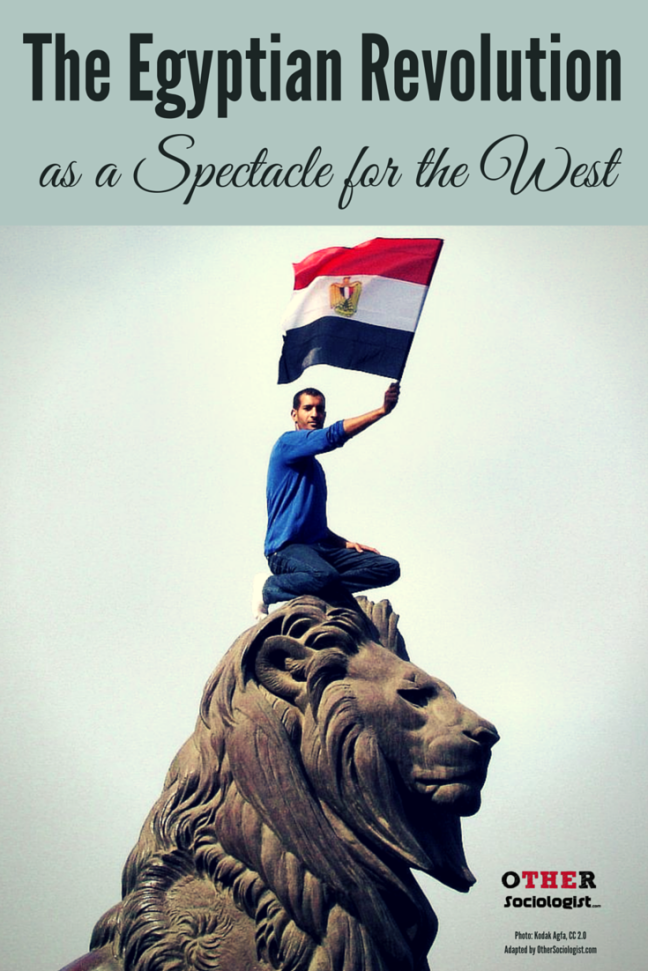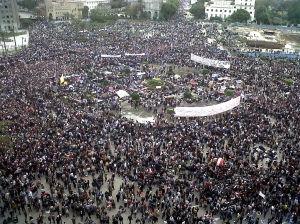By Zuleyka Zevallos
Julia Elyachar and Jessica Winegar have published a special edition of Cultural Anthropology on the Egyptian Revolution. Highlights include reflections on how the Revolution has impacted ethnography and anthropological writing and an exploration of the notion of martyrdom in the context of counter-revolution. My favourite piece is Mona Abaza’s critique of Western ‘academic tourists‘.
Abaza reports that she and her colleagues have been inundated with requests for research expertise, but without serious consideration of the ‘international division of labour’. That is, the resources, time, commitments and personal costs of lending knowledge and data to researchers from Britain and the USA who work in the safety of well-funded universities. Egyptians are hired as research assistants or translators, but their labour and subjective perspectives serve a Western reading of revolution. As a result, Abaza sees that Western academics have a tendency to discuss the Arab Spring through a lens of Orientalism.

Orientalism

Edward Said explains Orientalism as the process by which Western intellectuals over simplify, denounce and silence the experiences of Arab-speaking, Muslim and Middle Eastern people in general. Middle Eastern people are positioned as a barbaric, uncivilised, singular group whose existence should be pitied or criticised. The knowledge, history and cultural practices of Middle Eastern people are portrayed as ‘Other’ – as resolutely different and abnormal in comparison to Western European traditions.
Abaza uses a sociological perspective to argue that the same thing is happening with the Arab Spring. Western intellectuals visit Egypt as academic tourists, but they position themselves as experts on political Islam, revolutions and democracy. Egyptians and other Middle Eastern people are subjects to be studied and their services are exploited. Unlike Western academics who are looked to as ‘Middle Eastern experts’, Abaza and her colleagues in the Middle East have to contend with the question of ‘whose knowledge counts more’ in the making of academic discourses.
I see that Abaza’s analysis is even more compelling when considered in tandem with Stuart Hall’s notion of ‘the spectacle of The Other‘.
Spectacle of The Other

Hall argues that the media relies upon stereotypical images of minority groups (Black people specifically) to reproduce power hierarchies. Racial ‘difference’ is a commodity used to sell advertisements and it is used as fear mongering to sell the news. Symbols and images have underling symbolic meaning that go beyond the products or stories being told, because the people who produce them dictate how different categories of people are depicted. Rethinking Abaza’s argument in this light, the Egyptian Revolution becomes a spectacle of The Other – an event that is sensationalised to reproduce a narrative about the oppression of Middle Eastern subjects. The Egyptian people have finally stood up for themselves and demanded democracy. They aspire towards equality, defined through a Western understanding of political elections. (Never mind the growing political disaffection amongst Western voters.) Egyptians finally joined the 21st Century – they used Western tools such as social media to stand up against their regimes. (Even though they’ve been using these technologies as long as people have in Western countries.)
Stories of the Egyptian Revolution are told from the perspective of how Westerners understand Egypt and they do not really reflect the complexity of how Egyptians understand their own history. This approach does not really incorporate the personal biographies of the people involved and their evolving perceptions of their changing social reality.
Abaza’s article raises important issues about how academic researchers contribute to this process of othering, as well as the latent ethics underpinning Western intellectualism. Without the input of local Egyptian researchers and participants, Western academics would not be able to contribute original data to analyses of the Revolution. From whose point of view should this Revolution be told? At what social cost? What might happen to these local contributors when the Western media and academic interest wanes? Ideally, critical analyses of the Arab Spring should be conducted in equal collaboration with local contributors, researchers and activists who are living it on a daily basis. As Abaza points out, the reality does not match this ideal. This is ironical, given that Western enthusiasm for the Arab revolutions rest on a celebration that the ‘Arab Other’ is ‘finally’ pursuing equality and democracy.
Western scholarly practices are not value-free or exempt from exploitation. Abaza and her colleagues in the Middle East are fielding requests from Western academics who have yet to appreciate their position of privilege. Sociology calls attention to the way history is created by powerful elites. Following the tradition of Said and Hall, Abaza makes visible how Western academics who seek to criticise such historical processes are part of this elite. International research processes are not conducted in an egalitarian utopia of intellectual collaboration. Research involves labour, material resources and symbolic productions. As such the research voices that more likely to be heard are those coming from well-funded universities. International politics deserve ongoing attention, as do the processes in which political knowledge is produced; doing one while ignoring the other limits the scope of global change.
Connect With Me
Follow me @OtherSociology or click below!
Credits
Abaza’s article in Cultural Anthropology has been republished from Jadaliyya.
Images: 1) Cultural Anthropology 2) Wiki.


Dr. Zevalos, I might well fit the profile of “academic tourist” (I am pursuing the evolution of the Arab Revolutions for my master’s thesis). However, what brought me “site-seeing” was a humbling political awakening to the fact that Westerners, such as I, have failed to see Arabs as people. Western media, international affairs experts, and the authoritarian regime’s narrative has been all about threats, interests (nationalistic and regional), allegiances, etc. If the Arab revolutions do not awake us, Westerners, to Arabs as people, what will?
On that note, please direct me to any (translated) Arab sources you deem relevant to an Arab perspective on developing/related events and analysis.
Thank you!
Amador Sq. (ER Roque)
LikeLike
Hi Amador Sq.,
Thanks for your comment. I think it’s fine to study the revolutions, my point is about being ethical to the researchers and participants who collaborate or contribute to the research. Also, my critique is about not focusing on Egyptian people and other Middle Eastern groups as Other, but instead taking into consideration their cultural perspective and history.
There are many good Middle Eastern researchers; it depends on your research focus. As a starting point, you might like to try the researchers who write for the Arab Studies Institute and the Journal of Muslim Minority Affairs. International Crisis Group also have several researchers based in the Middle East. Good luck with your Masters!
LikeLike
Dr. Zevallos,
Thank you so much for your very thoughtful and helpful answer. I will definitely look into the sources you recommend–and continue to follow your work as well.
Eunice Roque/Amador Sq.
LikeLike
Dr. Zevallos,
Thank you so much for your very thoughtful and helpful response. I will definitely use the sources you recommend–and continue to follow your work.
Eunice Roque / Amador Sq.
LikeLike